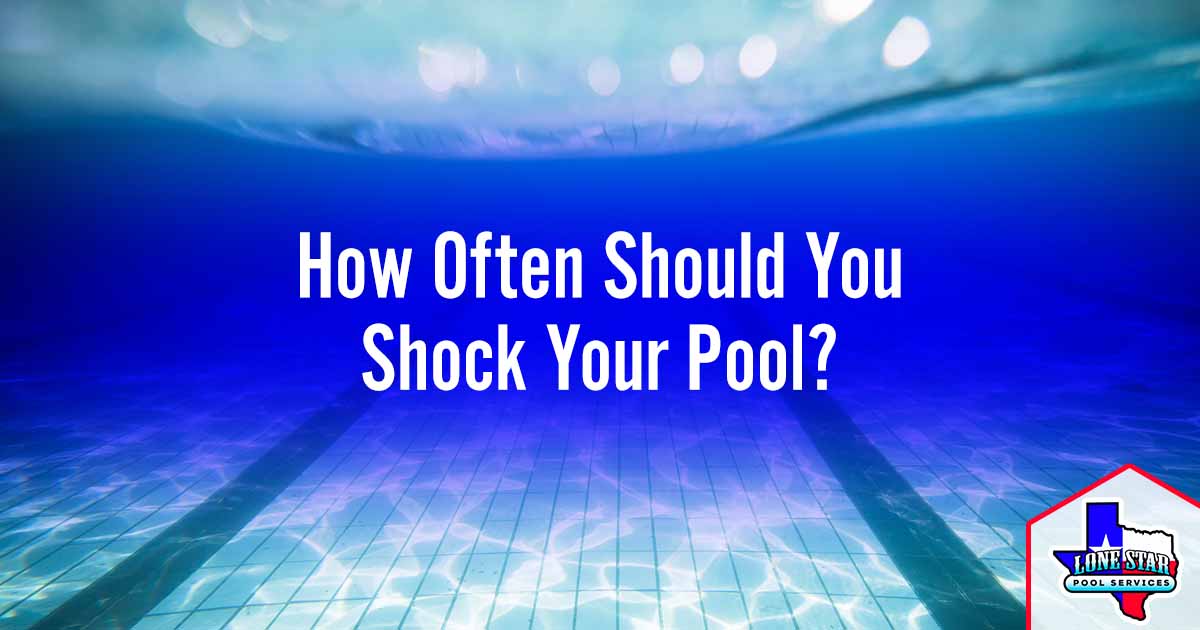When you own a pool there are many things you need to do to maintain it. Besides cleaning it regularly, you also need to shock it. If you’re new to being a pool owner, you may not even know what pool shock is or why it’s so important. Let’s take a closer look at pool shock as well as how often you should shock your pool.
What is Pool Shock?
Shock is a form of chlorine that is used to treat your pool. Pool shock is often referred to as a granular oxidizer. It can also be bought in a liquid form. The liquid form comes in a container similar to laundry bleach. It dissolves quickly because it is liquid and has no residue. You have to be careful when using liquid shock because if any gets on your clothes, it will bleach them.
Pool shock can also come in a granular form. This often has to be dissolved in water and then poured into your pool. The granular shock is often stronger than the liquid shock. It’s often less expensive than liquid shock and tends to be the more popular form. Some granular shock is also poured directly into the pool depending on the type.
Some people prefer the liquid shock while others will use the granular shock. You can use either one, so it simply depends on preference and if you need a stronger product.
How Do You Shock Your Pool?
When the filter is running, either pour or sprinkle the shock around the perimeter of your pool. Be sure that nothing sprinkles on you because it will bleach your clothing.
It’s recommended to avoid swimming in your pool 24-48 hours after you shock your pool. This will allow the chemicals to run through the water and not harm your skin or eyes. Always read the packaging on your pool shock to check the recommendations.
When Should You Shock Your Pool?
It’s best to shock your pool once the sun goes down and when the pool filter is running. If you put the shock in while it’s sunny out, it will not work as well. Never shock your pool when people are swimming in it. This is extremely dangerous. By waiting until the filter is running, you can be sure that the shock is filtered properly all around your pool.
How Often Should You Shock Your Pool?
It’s often recommended to shock your pool once a week. If you don’t do it every week, you should at least do it every other week. This is necessary to maintain your pool’s water chemistry.
If you have a lot of people over in your pool or have a party, you may want to shock your pool more frequently. This just helps to assure that your pool is clean.
You should use two pounds of shock for every 10,000 gallons of water that’s in your pool. This will assure that your pool gets the right amount of chemicals to treat it properly.
How Can I Tell if My Pool Needs Shock?
As a rule of thumb, you should shock your pool every week, even if you don’t think that it needs it. But, there are several instances when you should certainly shock your pool:
Shock your pool when you open it for the season to kill any bacteria or algae.
Shock your pool after heavy use or a party.
Shock your pool when it’s extremely hot and sunny. When the weather is too hot bacteria can grow and your chlorine level may lower.
Shock your pool after heavy rain because too much rain can increase pH levels and send contaminants into your pool.
Shock your pool if your smell chlorine or if swimmers’ eyes become irritated. If this happens it could mean that water has a build-up of chloramines. This is a clear indicator that your pool needs to be shocked.
Shock your pool when you close it. Although you’ll need to shock it again when you re-open your pool, it’s always a good idea to close your pool with clean water.
Some people also recommend that you shock your pool anytime the pH level is between 7.2 and 7.4,
Let Lone Star Pool Services Help with Your Pool Maintenance
Shocking your pool is just part of the required pool maintenance. Lone Star Pool Services can help you with this and all other weekly pool service needs.
Lone Star Pool Services has a service plan that includes the following:
Chemical Analysis & Maintenance
- Salt content on saltwater pool
- Phosphates
- Cyanuric Acid
- Alkalinity
- Calcium Hardness
- pH
- Chlorine
Pool Equipment Maintenance and Service Reporting
- Weekly e-mail notification and photographs
- Visual inspection of equipment and reporting of significant issues
- Monitor and maintain valve orientation for circulation adjustments
- Calibrate salt system as needed
- Clean salt cell as needed
- Backwash DE and sand filters as needed
- Monitor filter pressure
- Pool sweep operation checked
- Pool sweep wall screen checked and cleaned
- Pool sweep debris bags checked and emptied
- Pump baskets checked and emptied
- Skimmer baskets checked and emptied
- Vacuum as needed
- Clean spa
- Net debris
- Brush
That’s a long to-do list that many people don’t want to tackle or have the time to do. The team at Lone Star Pool Services does.

